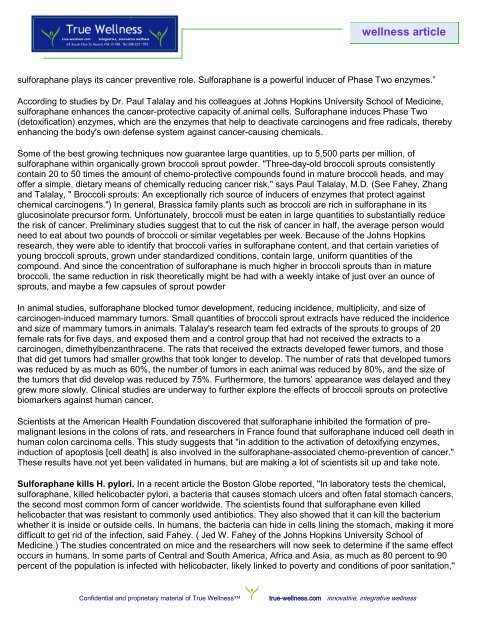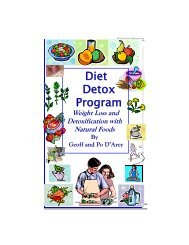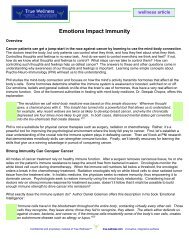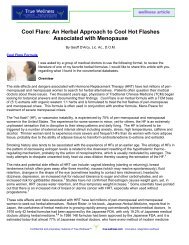Broccoli Sprouts, Cancer Prevention and ... - True-Wellness
Broccoli Sprouts, Cancer Prevention and ... - True-Wellness
Broccoli Sprouts, Cancer Prevention and ... - True-Wellness
You also want an ePaper? Increase the reach of your titles
YUMPU automatically turns print PDFs into web optimized ePapers that Google loves.
wellness article<br />
sulforaphane plays its cancer preventive role. Sulforaphane is a powerful inducer of Phase Two enzymes.”<br />
According to studies by Dr. Paul Talalay <strong>and</strong> his colleagues at Johns Hopkins University School of Medicine,<br />
sulforaphane enhances the cancer-protective capacity of animal cells. Sulforaphane induces Phase Two<br />
(detoxification) enzymes, which are the enzymes that help to deactivate carcinogens <strong>and</strong> free radicals, thereby<br />
enhancing the body's own defense system against cancer-causing chemicals.<br />
Some of the best growing techniques now guarantee large quantities, up to 5,500 parts per million, of<br />
sulforaphane within organically grown broccoli sprout powder. "Three-day-old broccoli sprouts consistently<br />
contain 20 to 50 times the amount of chemo-protective compounds found in mature broccoli heads, <strong>and</strong> may<br />
offer a simple, dietary means of chemically reducing cancer risk," says Paul Talalay, M.D. (See Fahey, Zhang<br />
<strong>and</strong> Talalay, " <strong>Broccoli</strong> sprouts: An exceptionally rich source of inducers of enzymes that protect against<br />
chemical carcinogens.") In general, Brassica family plants such as broccoli are rich in sulforaphane in its<br />
glucosinolate precursor form. Unfortunately, broccoli must be eaten in large quantities to substantially reduce<br />
the risk of cancer. Preliminary studies suggest that to cut the risk of cancer in half, the average person would<br />
need to eat about two pounds of broccoli or similar vegetables per week. Because of the Johns Hopkins<br />
research, they were able to identify that broccoli varies in sulforaphane content, <strong>and</strong> that certain varieties of<br />
young broccoli sprouts, grown under st<strong>and</strong>ardized conditions, contain large, uniform quantities of the<br />
compound. And since the concentration of sulforaphane is much higher in broccoli sprouts than in mature<br />
broccoli, the same reduction in risk theoretically might be had with a weekly intake of just over an ounce of<br />
sprouts, <strong>and</strong> maybe a few capsules of sprout powder<br />
In animal studies, sulforaphane blocked tumor development, reducing incidence, multiplicity, <strong>and</strong> size of<br />
carcinogen-induced mammary tumors. Small quantities of broccoli sprout extracts have reduced the incidence<br />
<strong>and</strong> size of mammary tumors in animals. Talalay's research team fed extracts of the sprouts to groups of 20<br />
female rats for five days, <strong>and</strong> exposed them <strong>and</strong> a control group that had not received the extracts to a<br />
carcinogen, dimethylbenzanthracene. The rats that received the extracts developed fewer tumors, <strong>and</strong> those<br />
that did get tumors had smaller growths that took longer to develop. The number of rats that developed tumors<br />
was reduced by as much as 60%, the number of tumors in each animal was reduced by 80%, <strong>and</strong> the size of<br />
the tumors that did develop was reduced by 75%. Furthermore, the tumors’ appearance was delayed <strong>and</strong> they<br />
grew more slowly. Clinical studies are underway to further explore the effects of broccoli sprouts on protective<br />
biomarkers against human cancer.<br />
Scientists at the American Health Foundation discovered that sulforaphane inhibited the formation of premalignant<br />
lesions in the colons of rats, <strong>and</strong> researchers in France found that sulforaphane induced cell death in<br />
human colon carcinoma cells. This study suggests that "in addition to the activation of detoxifying enzymes,<br />
induction of apoptosis [cell death] is also involved in the sulforaphane-associated chemo-prevention of cancer."<br />
These results have not yet been validated in humans, but are making a lot of scientists sit up <strong>and</strong> take note.<br />
Sulforaphane kills H. pylori. In a recent article the Boston Globe reported, "In laboratory tests the chemical,<br />
sulforaphane, killed helicobacter pylori, a bacteria that causes stomach ulcers <strong>and</strong> often fatal stomach cancers,<br />
the second most common form of cancer worldwide. The scientists found that sulforaphane even killed<br />
helicobacter that was resistant to commonly used antibiotics. They also showed that it can kill the bacterium<br />
whether it is inside or outside cells. In humans, the bacteria can hide in cells lining the stomach, making it more<br />
difficult to get rid of the infection, said Fahey. ( Jed W. Fahey of the Johns Hopkins University School of<br />
Medicine.) The studies concentrated on mice <strong>and</strong> the researchers will now seek to determine if the same effect<br />
occurs in humans. In some parts of Central <strong>and</strong> South America, Africa <strong>and</strong> Asia, as much as 80 percent to 90<br />
percent of the population is infected with helicobacter, likely linked to poverty <strong>and</strong> conditions of poor sanitation,''<br />
Confidential <strong>and</strong> proprietary material of <strong>True</strong> <strong>Wellness</strong><br />
true-wellness.com innovative, integrative wellness





